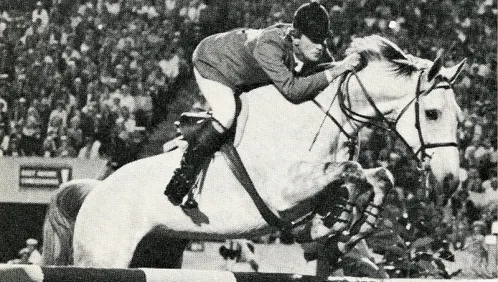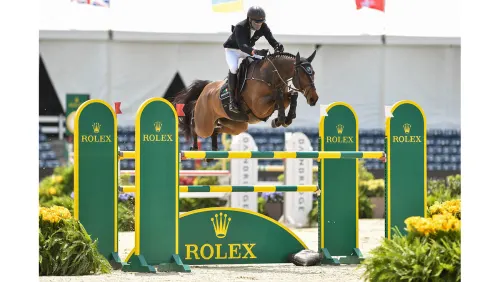In early August the Chronicle’s online forums hosted a lively thread about the goals and administration of the U.S. Hunter Jumper Association titled, “What Has The USHJA Done For You Lately?” In response to this discussion, the Chronicle invited USHJA Chief Executive Officer Shelby French to answer questions submitted by forums users.
In this, part two of three, French addresses questions about USHJA governance. Check out the first installment, focused on USHJA programs, and stay tuned for the third edition, focused on administration, on Tuesday, Aug. 23.
Q: What are the terms and term limits of various governance positions within the USHJA, and when are the next elections? Are there provisions that persons related by blood or marriage cannot simultaneously be seated in positions on the board and/or committees?
A: The Board has staggered terms, and elections occur every other year with approximately one half of the Board seats open for election. The next election occurs in December 2012. We always post this information on the website and provide member notification through its E-News and Facebook.
The term limits of all positions all clearly detailed in the bylaws of the organization.
This may be more information than you want, but Directors are limited to a maximum of two consecutive full terms of four years and must be off the Board for at least 350 days following their last term to be eligible to serve a future term. However, a Director elected to fill a vacancy and serve a partial term shall not have that service affect his right to serve a maximum of two consecutive full terms as stated above.
Any Director may be elected to an Officer position for a maximum of two additional consecutive four-year terms, regardless of prior continuous service as a Director or Officer. However, no matter what their configuration of service, no person may serve more than four consecutive terms. After serving as president, an individual must wait 350 days before being considered for reelection to the Board in any capacity.
I am curious regarding the reason behind asking about relatives serving on the same committee, because the reality is that in my experience in USHJA governance, I have never experienced an individual being reluctant to express his or her opinion regardless of opinion of a spouse, sibling or significant other.
Regardless, there are no provisions regarding blood or marriage relationships, as those would be discriminatory. Additionally, if you restricted participation by blood or marriage, you would also have to include any cohabitants and even consider how such a restriction would affect the blood relatives of those cohabitants.
Blood relationships and cohabitant relationships would include a significant number of family members who participate in our sport, especially when equestrians marry or cohabitate with other equestrians.
However, there are currently no members of the Board of Directors who are related to each other, cohabitating or married. Also, USHJA requires every Board and Committee member to sign a conflict of interest statement which requires the Director or Committee member to disclose any conflicts which may affect their ability to provide unbiased input. USHJA takes this policy very seriously, and when sensitive matters are being discussed the Committee’s and Board members are reminded of this policy.
Q: Is a member to be removed or suspended from the Board of Directors, a USHJA committee or another governance position if he or she is disciplined by the FEI or USHJA?
A: In accordance with our Bylaws, the USHJA shall uphold all findings of the Federation Hearing Committee. Therefore, if an individual is suspended by the Federation, they are suspended from participating in the USHJA. This would cover those suspended by the FEI, provided that the Federation has reviewed the FEI suspension and imposed a suspension.
ADVERTISEMENT
Q: Could you please state the purpose and goals of the Hunter Restructure Committee?
A: The Hunter Restructure Committee was created to conduct an extensive review of the hunter part of our sport. Part of their task is to look at the positive and the negative in our sport and develop methods to increase participation by bringing our sport into the future. Components that have traditionally been offered may not fit our current reality and therefore are not practical in the effort to bring more people into the hunter/jumper community.
The committee has spent considerable time to query and review data provided through our relationship with the Federation. The committee has proposed several rule changes to offer participants and organizers more flexibility in order to give more people a chance to find their niche in the community.
Their efforts will be ongoing—they’ll continued to analyze the results of changes implemented and make further recommendations to achieve their mission.
Q: Why was the Horse Welfare Committee renamed the Horse and Rider Welfare Committee? Aren’t the interests of these two groups potentially divergent? Please provide a brief summary of the USHJA’s Horse Welfare activities from the inception of the organization to date, and any future plans along those lines currently under discussion.
A: To be correct, the Horse Welfare Committee was renamed the Horse and Rider Advocates Committee. The Board approved this Planning Committee recommendation in order to provide a means within the organization for members to communicate their concerns on issues related to horse and rider safety and wellbeing.
Prior to adding this component to the committee, there was no committee avenue for members to voice concerns on rider issues. The members of this committee take their responsibilities seriously and have not given leadership any reason to believe that they are conflicted between consideration of the welfare of horses and riders.
The committee members have published numerous articles in the USHJA In Stride magazine on topics such as longeing, use and misuse of medications, shipping, nutrition, and general care of horses. The committee will also be addressing rider issues similar to those of our equine partners, including fitness, nutrition and preventive medicine.
This committee has proposed several rule changes which have improved the environment for our equine partners and continues to assist other committees in raising awareness of issues which impact our horses and participants. For example, the committee supports the proposed rule to require safety helmets to be worn at all times while mounted on the showgrounds.
Q: Why was the Owner Committee done away with? As a non-riding owner (and I doubt I’m the only one) I don’t feel confident my interests are 100 percent represented by the Professional and Amateur committees. Why not an Owners/Breeders Committee?
A: The Owners Committee was not dismantled, it was re-named the Owners Task Force and moved under the Amateurs Committee. The Board approved this recommendation from the Planning Committee, as the majority of members of the Owners Committee were also Amateur competitors, creating two amateur committees within the governance structure. True non-competing owners are very rare in our sport and are eligible to participate as members of the Owners Task Force.
The connection between the Amateur Committee and Owners Task Force is very strong and better served from this change. Now they will bring forward issues from a united perspective, versus working on parallel paths to the same result. The Owners Task Force has been very busy this year working on a revision of the Owners Guide, and they’ve also created the Owners Legacy Award, which will be awarded for the first time at this year’s Annual Meeting.
Q: Should there be a limit to the number of committees on which a person may serve?
ADVERTISEMENT
A: When the USHJA started, the organization did have a restriction on the number of committees on which a person could serve. We discovered that the work of many committees is intertwined with the work of others, and the limitation was not helping communication between these committees.
The creation of the USHJA has provided the opportunity for several hundred new faces to become involved in the governance of our sport. When the hunter/jumpers were under the Federation, the opportunity to be part of the organization was very limited, and I was one of those who could never get involved no matter how hard I tried. Even with the addition of many new equestrians in the governance of our sport, there are still those who work and those who just show up.
There is also the need to be able to utilize the historical experience of members who have been in the world of governance for a long time. These members help to educate the new people, some of whom will become the future leaders.
However, it is true that we need to ensure that committee members who are hard workers don’t end up on too many committees simultaneously. I have recommended that the Board reconsider establishing a committee service limit, but certainly the three committee limit that was originally in place is too restrictive and doesn’t serve the interests of the Association.
Q: How can members find out when there’s an opening on a USHJA committee?
A: I keep a running list of members who contact the office and express an interest in serving on a committee. Staff members forward names they receive to me to be added to this list. Also, members often contact Bill Moroney or a Committee Chair directly and are also added to this master list.
When a committee has a vacancy, I then go to this master list to see who has an expressed an interest in serving on that committee, check to see if any of these individuals will help balance the committee geographically or demographically, and then I contact the committee chair for his or her input prior to making a recommendation to the president regarding an appointment.
USHJA has also used committee interest sign-up forms at Annual Meetings in the years prior to the reseating of committees, so that interested people can let the organization know their areas of experience, level of participation and geographic location. Following the last use of the sign up forms, 90 members (not already on a committee) of the 130 members who gave their information were seated on committees the following year.
Geographic location and level of participation are part of the parameters utilized when the president makes appointments. Most committees are populated by the membership through their Zone Hunter and Jumper Councils, the Affiliates Council, the Board, and then the president makes additional appointments to create balance.
Staff and leadership contact information is printed in every copy of In Stride and available on the USHJA website, so all a member has to do is email or call, and I am glad to say that our members seem to be quite comfortable contacting me directly whenever they have an issue. For me, email works best because I can access it wherever I am and anytime of the day or night.
Shelby French took over as the USHJA’s Chief Executive Officer in May. She had previously been the director of riding at Sweet Briar College (Va.) and the director of riding at St. Andrews Presbyterian College (N.C.). She created the DVD series The American System Of Forward Riding. She also serves as a Between Rounds columnist for The Chronicle of the Horse.
Are you a USHJA member with specific questions for French? Contact her directly at sfrench@ushja.org. Check back for the third installment of her Q & A, focused on administration, on Tuesday, Aug. 23.















